Essay: Modernity, Hegemony, and Elderly Abuse in Nursing Homes
VerifiedAdded on 2023/04/03
|6
|1377
|304
Essay
AI Summary
This essay delves into the issue of elderly abuse in nursing homes, framing it as a consequence of social changes driven by modernity and the concept of hegemony. The paper begins by highlighting the prevalence of elder abuse within healthcare settings, particularly in nursing homes, and the vulnerability of the elderly population. It then introduces the concept of hegemony, arguing that the influence of powerful entities, such as healthcare professionals, contributes to the mistreatment of the elderly. The essay explores how cultural values, such as individualism, prevalent in countries like Australia, exacerbate the problem by diminishing respect and emotional connection with the elderly. The analysis includes a discussion of the need for improved reporting requirements, cultural shifts, and a reevaluation of societal values to address and prevent elder abuse. The paper concludes by emphasizing the importance of recognizing the elderly population as valuable contributors to society and the need for systemic changes to protect their well-being.
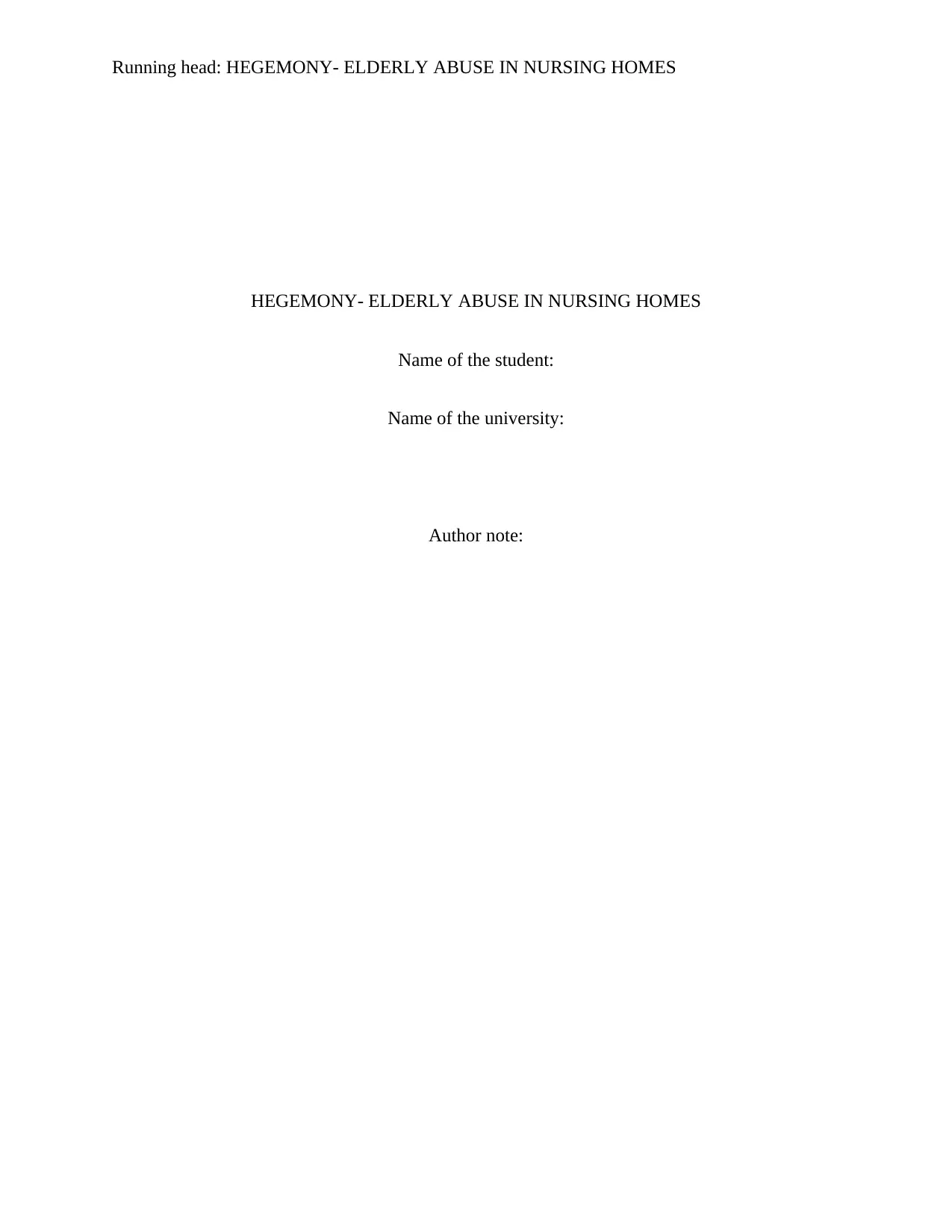
Running head: HEGEMONY- ELDERLY ABUSE IN NURSING HOMES
HEGEMONY- ELDERLY ABUSE IN NURSING HOMES
Name of the student:
Name of the university:
Author note:
HEGEMONY- ELDERLY ABUSE IN NURSING HOMES
Name of the student:
Name of the university:
Author note:
Paraphrase This Document
Need a fresh take? Get an instant paraphrase of this document with our AI Paraphraser
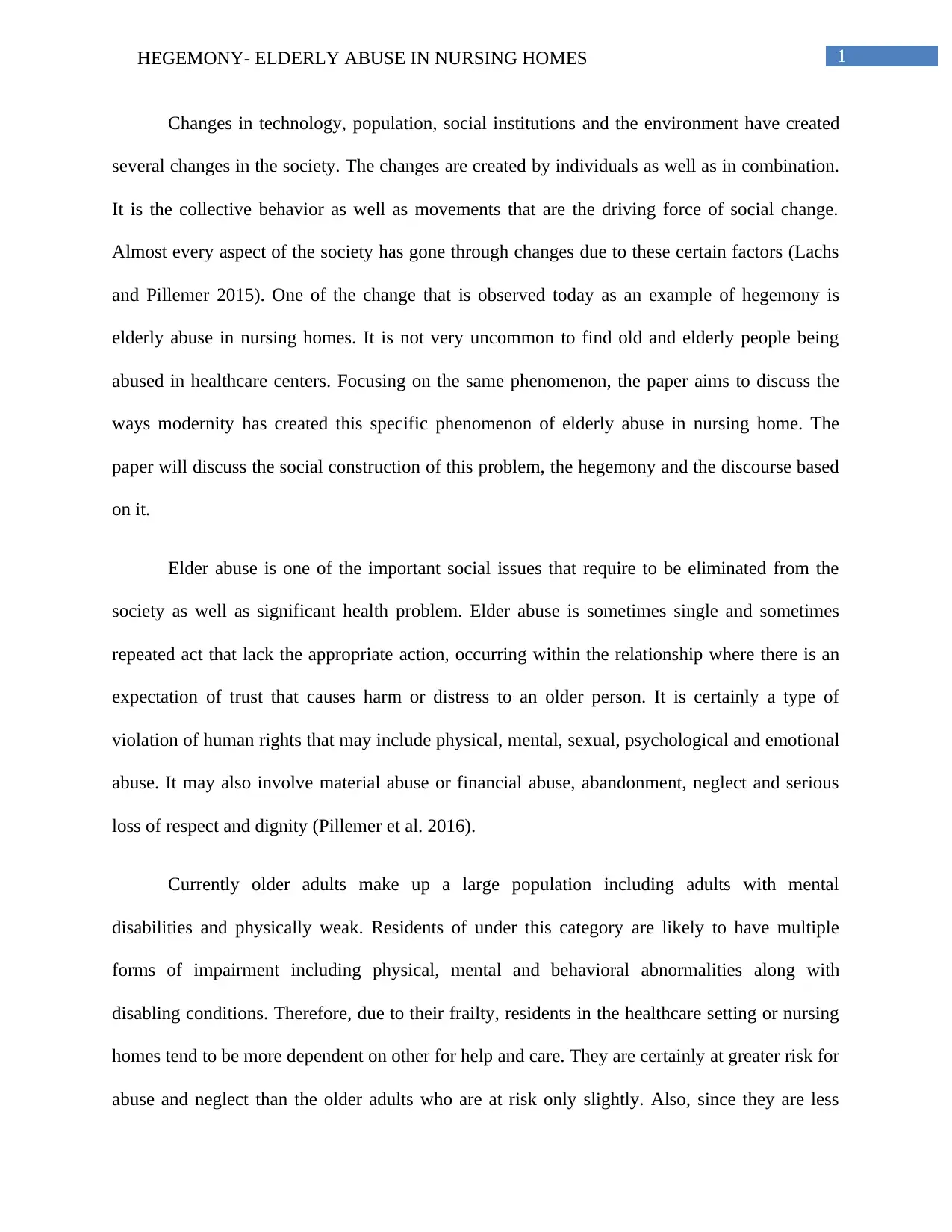
1HEGEMONY- ELDERLY ABUSE IN NURSING HOMES
Changes in technology, population, social institutions and the environment have created
several changes in the society. The changes are created by individuals as well as in combination.
It is the collective behavior as well as movements that are the driving force of social change.
Almost every aspect of the society has gone through changes due to these certain factors (Lachs
and Pillemer 2015). One of the change that is observed today as an example of hegemony is
elderly abuse in nursing homes. It is not very uncommon to find old and elderly people being
abused in healthcare centers. Focusing on the same phenomenon, the paper aims to discuss the
ways modernity has created this specific phenomenon of elderly abuse in nursing home. The
paper will discuss the social construction of this problem, the hegemony and the discourse based
on it.
Elder abuse is one of the important social issues that require to be eliminated from the
society as well as significant health problem. Elder abuse is sometimes single and sometimes
repeated act that lack the appropriate action, occurring within the relationship where there is an
expectation of trust that causes harm or distress to an older person. It is certainly a type of
violation of human rights that may include physical, mental, sexual, psychological and emotional
abuse. It may also involve material abuse or financial abuse, abandonment, neglect and serious
loss of respect and dignity (Pillemer et al. 2016).
Currently older adults make up a large population including adults with mental
disabilities and physically weak. Residents of under this category are likely to have multiple
forms of impairment including physical, mental and behavioral abnormalities along with
disabling conditions. Therefore, due to their frailty, residents in the healthcare setting or nursing
homes tend to be more dependent on other for help and care. They are certainly at greater risk for
abuse and neglect than the older adults who are at risk only slightly. Also, since they are less
Changes in technology, population, social institutions and the environment have created
several changes in the society. The changes are created by individuals as well as in combination.
It is the collective behavior as well as movements that are the driving force of social change.
Almost every aspect of the society has gone through changes due to these certain factors (Lachs
and Pillemer 2015). One of the change that is observed today as an example of hegemony is
elderly abuse in nursing homes. It is not very uncommon to find old and elderly people being
abused in healthcare centers. Focusing on the same phenomenon, the paper aims to discuss the
ways modernity has created this specific phenomenon of elderly abuse in nursing home. The
paper will discuss the social construction of this problem, the hegemony and the discourse based
on it.
Elder abuse is one of the important social issues that require to be eliminated from the
society as well as significant health problem. Elder abuse is sometimes single and sometimes
repeated act that lack the appropriate action, occurring within the relationship where there is an
expectation of trust that causes harm or distress to an older person. It is certainly a type of
violation of human rights that may include physical, mental, sexual, psychological and emotional
abuse. It may also involve material abuse or financial abuse, abandonment, neglect and serious
loss of respect and dignity (Pillemer et al. 2016).
Currently older adults make up a large population including adults with mental
disabilities and physically weak. Residents of under this category are likely to have multiple
forms of impairment including physical, mental and behavioral abnormalities along with
disabling conditions. Therefore, due to their frailty, residents in the healthcare setting or nursing
homes tend to be more dependent on other for help and care. They are certainly at greater risk for
abuse and neglect than the older adults who are at risk only slightly. Also, since they are less
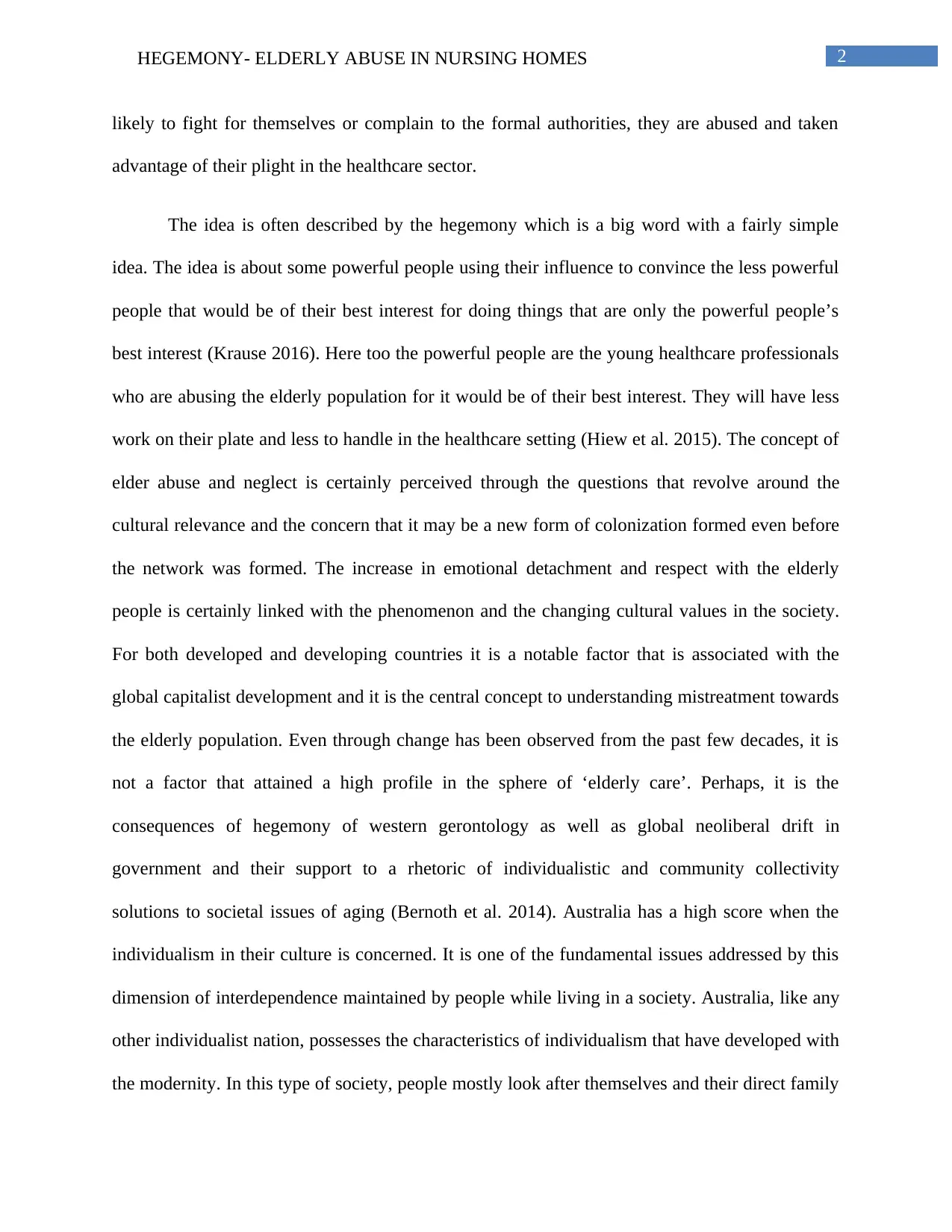
2HEGEMONY- ELDERLY ABUSE IN NURSING HOMES
likely to fight for themselves or complain to the formal authorities, they are abused and taken
advantage of their plight in the healthcare sector.
The idea is often described by the hegemony which is a big word with a fairly simple
idea. The idea is about some powerful people using their influence to convince the less powerful
people that would be of their best interest for doing things that are only the powerful people’s
best interest (Krause 2016). Here too the powerful people are the young healthcare professionals
who are abusing the elderly population for it would be of their best interest. They will have less
work on their plate and less to handle in the healthcare setting (Hiew et al. 2015). The concept of
elder abuse and neglect is certainly perceived through the questions that revolve around the
cultural relevance and the concern that it may be a new form of colonization formed even before
the network was formed. The increase in emotional detachment and respect with the elderly
people is certainly linked with the phenomenon and the changing cultural values in the society.
For both developed and developing countries it is a notable factor that is associated with the
global capitalist development and it is the central concept to understanding mistreatment towards
the elderly population. Even through change has been observed from the past few decades, it is
not a factor that attained a high profile in the sphere of ‘elderly care’. Perhaps, it is the
consequences of hegemony of western gerontology as well as global neoliberal drift in
government and their support to a rhetoric of individualistic and community collectivity
solutions to societal issues of aging (Bernoth et al. 2014). Australia has a high score when the
individualism in their culture is concerned. It is one of the fundamental issues addressed by this
dimension of interdependence maintained by people while living in a society. Australia, like any
other individualist nation, possesses the characteristics of individualism that have developed with
the modernity. In this type of society, people mostly look after themselves and their direct family
likely to fight for themselves or complain to the formal authorities, they are abused and taken
advantage of their plight in the healthcare sector.
The idea is often described by the hegemony which is a big word with a fairly simple
idea. The idea is about some powerful people using their influence to convince the less powerful
people that would be of their best interest for doing things that are only the powerful people’s
best interest (Krause 2016). Here too the powerful people are the young healthcare professionals
who are abusing the elderly population for it would be of their best interest. They will have less
work on their plate and less to handle in the healthcare setting (Hiew et al. 2015). The concept of
elder abuse and neglect is certainly perceived through the questions that revolve around the
cultural relevance and the concern that it may be a new form of colonization formed even before
the network was formed. The increase in emotional detachment and respect with the elderly
people is certainly linked with the phenomenon and the changing cultural values in the society.
For both developed and developing countries it is a notable factor that is associated with the
global capitalist development and it is the central concept to understanding mistreatment towards
the elderly population. Even through change has been observed from the past few decades, it is
not a factor that attained a high profile in the sphere of ‘elderly care’. Perhaps, it is the
consequences of hegemony of western gerontology as well as global neoliberal drift in
government and their support to a rhetoric of individualistic and community collectivity
solutions to societal issues of aging (Bernoth et al. 2014). Australia has a high score when the
individualism in their culture is concerned. It is one of the fundamental issues addressed by this
dimension of interdependence maintained by people while living in a society. Australia, like any
other individualist nation, possesses the characteristics of individualism that have developed with
the modernity. In this type of society, people mostly look after themselves and their direct family
⊘ This is a preview!⊘
Do you want full access?
Subscribe today to unlock all pages.

Trusted by 1+ million students worldwide
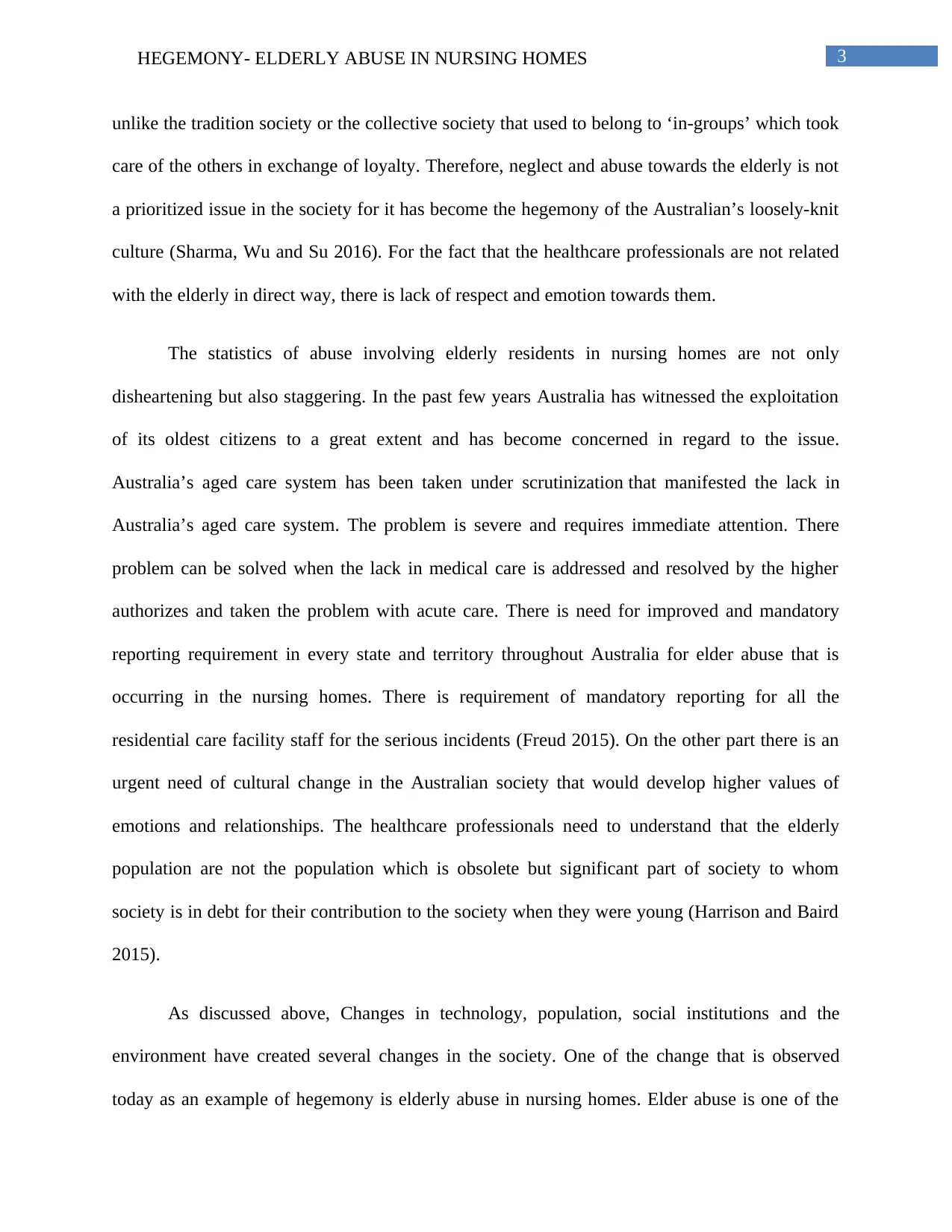
3HEGEMONY- ELDERLY ABUSE IN NURSING HOMES
unlike the tradition society or the collective society that used to belong to ‘in-groups’ which took
care of the others in exchange of loyalty. Therefore, neglect and abuse towards the elderly is not
a prioritized issue in the society for it has become the hegemony of the Australian’s loosely-knit
culture (Sharma, Wu and Su 2016). For the fact that the healthcare professionals are not related
with the elderly in direct way, there is lack of respect and emotion towards them.
The statistics of abuse involving elderly residents in nursing homes are not only
disheartening but also staggering. In the past few years Australia has witnessed the exploitation
of its oldest citizens to a great extent and has become concerned in regard to the issue.
Australia’s aged care system has been taken under scrutinization that manifested the lack in
Australia’s aged care system. The problem is severe and requires immediate attention. There
problem can be solved when the lack in medical care is addressed and resolved by the higher
authorizes and taken the problem with acute care. There is need for improved and mandatory
reporting requirement in every state and territory throughout Australia for elder abuse that is
occurring in the nursing homes. There is requirement of mandatory reporting for all the
residential care facility staff for the serious incidents (Freud 2015). On the other part there is an
urgent need of cultural change in the Australian society that would develop higher values of
emotions and relationships. The healthcare professionals need to understand that the elderly
population are not the population which is obsolete but significant part of society to whom
society is in debt for their contribution to the society when they were young (Harrison and Baird
2015).
As discussed above, Changes in technology, population, social institutions and the
environment have created several changes in the society. One of the change that is observed
today as an example of hegemony is elderly abuse in nursing homes. Elder abuse is one of the
unlike the tradition society or the collective society that used to belong to ‘in-groups’ which took
care of the others in exchange of loyalty. Therefore, neglect and abuse towards the elderly is not
a prioritized issue in the society for it has become the hegemony of the Australian’s loosely-knit
culture (Sharma, Wu and Su 2016). For the fact that the healthcare professionals are not related
with the elderly in direct way, there is lack of respect and emotion towards them.
The statistics of abuse involving elderly residents in nursing homes are not only
disheartening but also staggering. In the past few years Australia has witnessed the exploitation
of its oldest citizens to a great extent and has become concerned in regard to the issue.
Australia’s aged care system has been taken under scrutinization that manifested the lack in
Australia’s aged care system. The problem is severe and requires immediate attention. There
problem can be solved when the lack in medical care is addressed and resolved by the higher
authorizes and taken the problem with acute care. There is need for improved and mandatory
reporting requirement in every state and territory throughout Australia for elder abuse that is
occurring in the nursing homes. There is requirement of mandatory reporting for all the
residential care facility staff for the serious incidents (Freud 2015). On the other part there is an
urgent need of cultural change in the Australian society that would develop higher values of
emotions and relationships. The healthcare professionals need to understand that the elderly
population are not the population which is obsolete but significant part of society to whom
society is in debt for their contribution to the society when they were young (Harrison and Baird
2015).
As discussed above, Changes in technology, population, social institutions and the
environment have created several changes in the society. One of the change that is observed
today as an example of hegemony is elderly abuse in nursing homes. Elder abuse is one of the
Paraphrase This Document
Need a fresh take? Get an instant paraphrase of this document with our AI Paraphraser
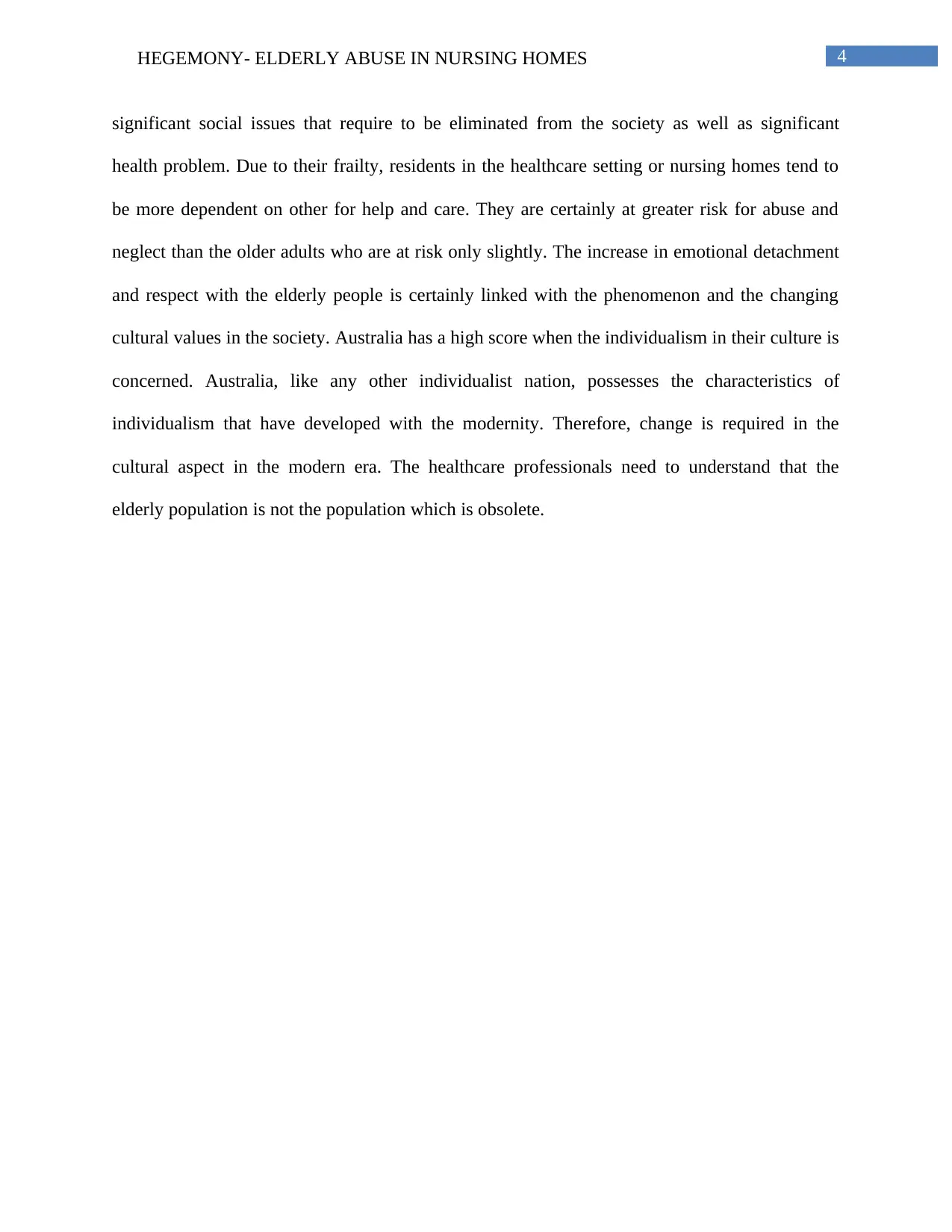
4HEGEMONY- ELDERLY ABUSE IN NURSING HOMES
significant social issues that require to be eliminated from the society as well as significant
health problem. Due to their frailty, residents in the healthcare setting or nursing homes tend to
be more dependent on other for help and care. They are certainly at greater risk for abuse and
neglect than the older adults who are at risk only slightly. The increase in emotional detachment
and respect with the elderly people is certainly linked with the phenomenon and the changing
cultural values in the society. Australia has a high score when the individualism in their culture is
concerned. Australia, like any other individualist nation, possesses the characteristics of
individualism that have developed with the modernity. Therefore, change is required in the
cultural aspect in the modern era. The healthcare professionals need to understand that the
elderly population is not the population which is obsolete.
significant social issues that require to be eliminated from the society as well as significant
health problem. Due to their frailty, residents in the healthcare setting or nursing homes tend to
be more dependent on other for help and care. They are certainly at greater risk for abuse and
neglect than the older adults who are at risk only slightly. The increase in emotional detachment
and respect with the elderly people is certainly linked with the phenomenon and the changing
cultural values in the society. Australia has a high score when the individualism in their culture is
concerned. Australia, like any other individualist nation, possesses the characteristics of
individualism that have developed with the modernity. Therefore, change is required in the
cultural aspect in the modern era. The healthcare professionals need to understand that the
elderly population is not the population which is obsolete.
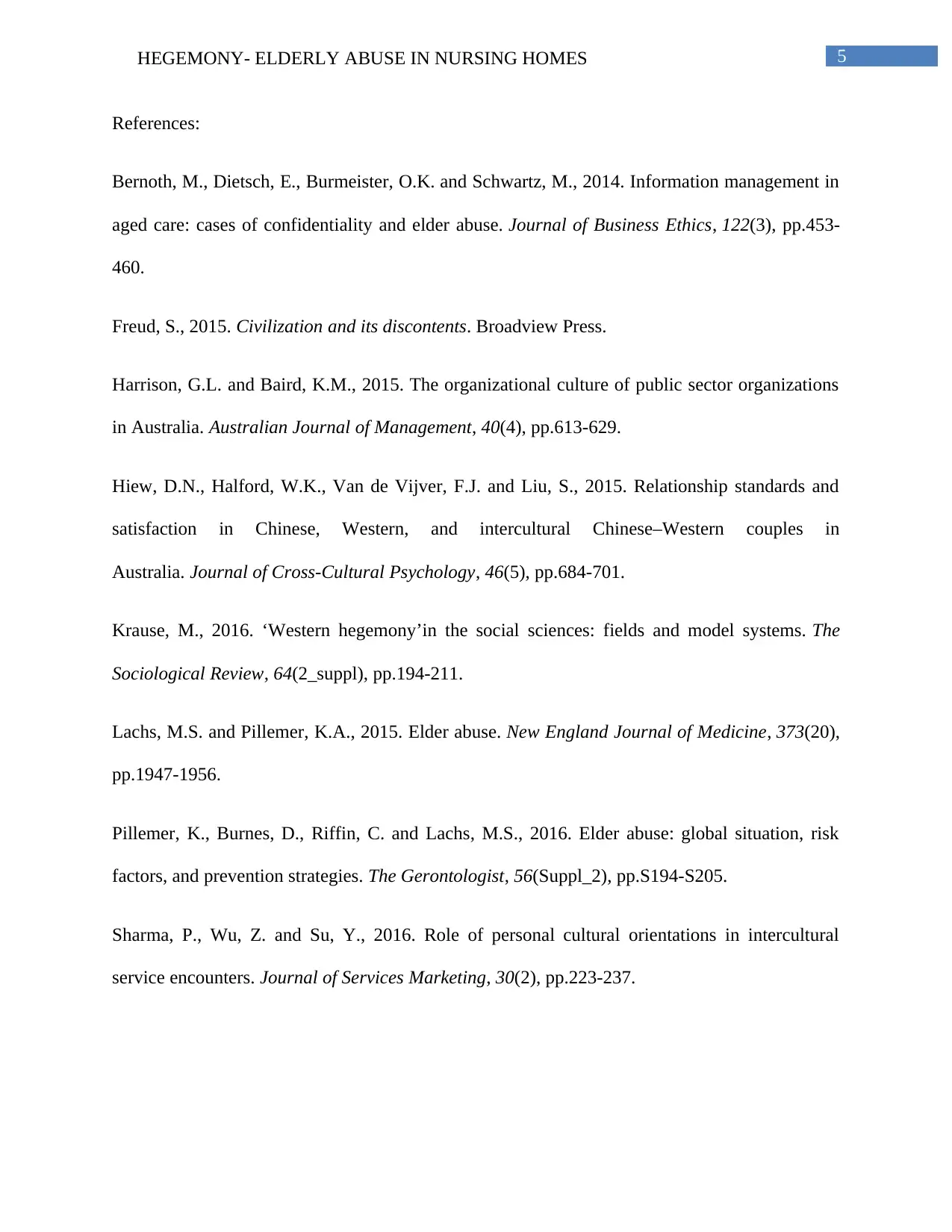
5HEGEMONY- ELDERLY ABUSE IN NURSING HOMES
References:
Bernoth, M., Dietsch, E., Burmeister, O.K. and Schwartz, M., 2014. Information management in
aged care: cases of confidentiality and elder abuse. Journal of Business Ethics, 122(3), pp.453-
460.
Freud, S., 2015. Civilization and its discontents. Broadview Press.
Harrison, G.L. and Baird, K.M., 2015. The organizational culture of public sector organizations
in Australia. Australian Journal of Management, 40(4), pp.613-629.
Hiew, D.N., Halford, W.K., Van de Vijver, F.J. and Liu, S., 2015. Relationship standards and
satisfaction in Chinese, Western, and intercultural Chinese–Western couples in
Australia. Journal of Cross-Cultural Psychology, 46(5), pp.684-701.
Krause, M., 2016. ‘Western hegemony’in the social sciences: fields and model systems. The
Sociological Review, 64(2_suppl), pp.194-211.
Lachs, M.S. and Pillemer, K.A., 2015. Elder abuse. New England Journal of Medicine, 373(20),
pp.1947-1956.
Pillemer, K., Burnes, D., Riffin, C. and Lachs, M.S., 2016. Elder abuse: global situation, risk
factors, and prevention strategies. The Gerontologist, 56(Suppl_2), pp.S194-S205.
Sharma, P., Wu, Z. and Su, Y., 2016. Role of personal cultural orientations in intercultural
service encounters. Journal of Services Marketing, 30(2), pp.223-237.
References:
Bernoth, M., Dietsch, E., Burmeister, O.K. and Schwartz, M., 2014. Information management in
aged care: cases of confidentiality and elder abuse. Journal of Business Ethics, 122(3), pp.453-
460.
Freud, S., 2015. Civilization and its discontents. Broadview Press.
Harrison, G.L. and Baird, K.M., 2015. The organizational culture of public sector organizations
in Australia. Australian Journal of Management, 40(4), pp.613-629.
Hiew, D.N., Halford, W.K., Van de Vijver, F.J. and Liu, S., 2015. Relationship standards and
satisfaction in Chinese, Western, and intercultural Chinese–Western couples in
Australia. Journal of Cross-Cultural Psychology, 46(5), pp.684-701.
Krause, M., 2016. ‘Western hegemony’in the social sciences: fields and model systems. The
Sociological Review, 64(2_suppl), pp.194-211.
Lachs, M.S. and Pillemer, K.A., 2015. Elder abuse. New England Journal of Medicine, 373(20),
pp.1947-1956.
Pillemer, K., Burnes, D., Riffin, C. and Lachs, M.S., 2016. Elder abuse: global situation, risk
factors, and prevention strategies. The Gerontologist, 56(Suppl_2), pp.S194-S205.
Sharma, P., Wu, Z. and Su, Y., 2016. Role of personal cultural orientations in intercultural
service encounters. Journal of Services Marketing, 30(2), pp.223-237.
⊘ This is a preview!⊘
Do you want full access?
Subscribe today to unlock all pages.

Trusted by 1+ million students worldwide
1 out of 6
Related Documents
Your All-in-One AI-Powered Toolkit for Academic Success.
+13062052269
info@desklib.com
Available 24*7 on WhatsApp / Email
![[object Object]](/_next/static/media/star-bottom.7253800d.svg)
Unlock your academic potential
Copyright © 2020–2026 A2Z Services. All Rights Reserved. Developed and managed by ZUCOL.





